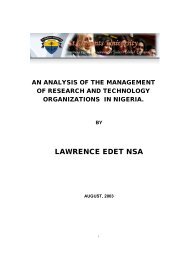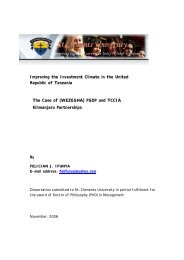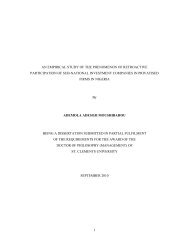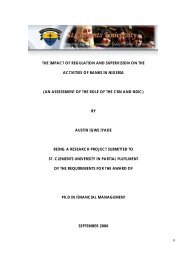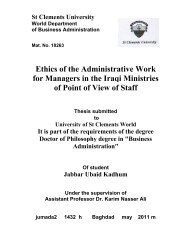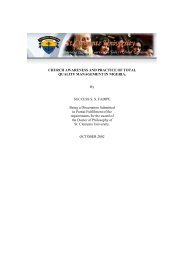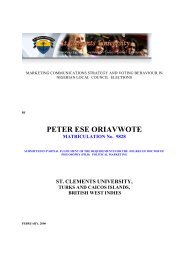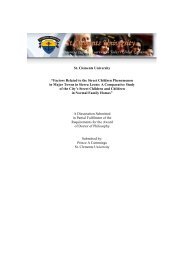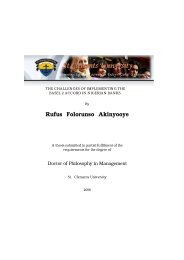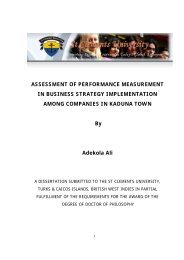The role of informal microfinance institutions in saving
The role of informal microfinance institutions in saving
The role of informal microfinance institutions in saving
You also want an ePaper? Increase the reach of your titles
YUMPU automatically turns print PDFs into web optimized ePapers that Google loves.
eturn <strong>in</strong> tightly regulated f<strong>in</strong>ancial markets or to the higher, riskier rates <strong>of</strong> return <strong>in</strong> the<br />
unregulated markets. On the other hand borrowers are restricted to the high rates <strong>of</strong> <strong>in</strong>terest<br />
charges by banks or are constra<strong>in</strong>ed by the amount <strong>of</strong> credit available on the high-risk<br />
unregulated markets.<br />
In stock markets there are no stipulated ceil<strong>in</strong>gs on returns. As a consequence they <strong>of</strong>fer an<br />
alternative to safe but low, sometimes negative real rates <strong>of</strong> return. <strong>The</strong>y provide <strong>in</strong>vestors<br />
with a greater range <strong>of</strong> risk and return opportunities than a bank-based f<strong>in</strong>ancial market.<br />
<strong>The</strong>y also allow for a better match<strong>in</strong>g <strong>of</strong> the risk and return characteristics <strong>of</strong> lenders and<br />
borrowers. In addition, <strong>in</strong>vestors have the choice <strong>of</strong> switch<strong>in</strong>g to less risky assets with stable<br />
returns or to relatively safe bank <strong>in</strong>struments where stock returns fail to compensate for risk.<br />
Stock markets allow risk shar<strong>in</strong>g, without the need for government guarantees. Expected<br />
returns are driven by the performance and prospects <strong>of</strong> the company itself, and not by<br />
government guarantees.<br />
From both a practical and theoretical perspectives an issue <strong>of</strong> importance for stock markets is<br />
the demand for domestic securities. <strong>The</strong> demand for securities <strong>of</strong> emerg<strong>in</strong>g markets <strong>in</strong> a<br />
globalized world market is partly due to the potential reduction <strong>in</strong> risk and <strong>in</strong>crease <strong>in</strong> return<br />
as a result <strong>of</strong> <strong>in</strong>ternational diversification. Accord<strong>in</strong>g to the modern portfolio theory analysis<br />
<strong>of</strong> a portfolio should be based on the expected returns from each asset, the variance <strong>of</strong> returns<br />
and the covariance between securities. <strong>The</strong> variance is important <strong>in</strong> any given market, because<br />
by <strong>in</strong>creas<strong>in</strong>g the number <strong>of</strong> assets <strong>in</strong> a portfolio, the unsystematic (diversifiable) risk can be<br />
diversified, but the contribution <strong>of</strong> each asset to the total risk caused by the covariance terms<br />
are systematic (non-diversifiable) risk.<br />
International diversification depends crucially on the correlation <strong>of</strong> securities between<br />
countries which is <strong>of</strong>ten less than the correlations between securities <strong>of</strong> a s<strong>in</strong>gle country. <strong>The</strong><br />
correlation is computed as the covariance <strong>of</strong> securities with<strong>in</strong> one country with securities <strong>of</strong><br />
another divided by the product <strong>of</strong> the standard deviation between each country’s securities.<br />
Thus <strong>in</strong>clud<strong>in</strong>g foreign securities may also have the effect <strong>of</strong> reduc<strong>in</strong>g the covariance terms,<br />
thereby reduc<strong>in</strong>g the covariance terms, thereby reduc<strong>in</strong>g the level <strong>of</strong> non-diversifiable<br />
104



